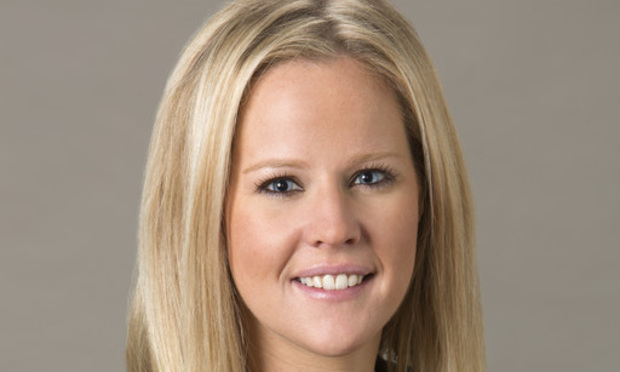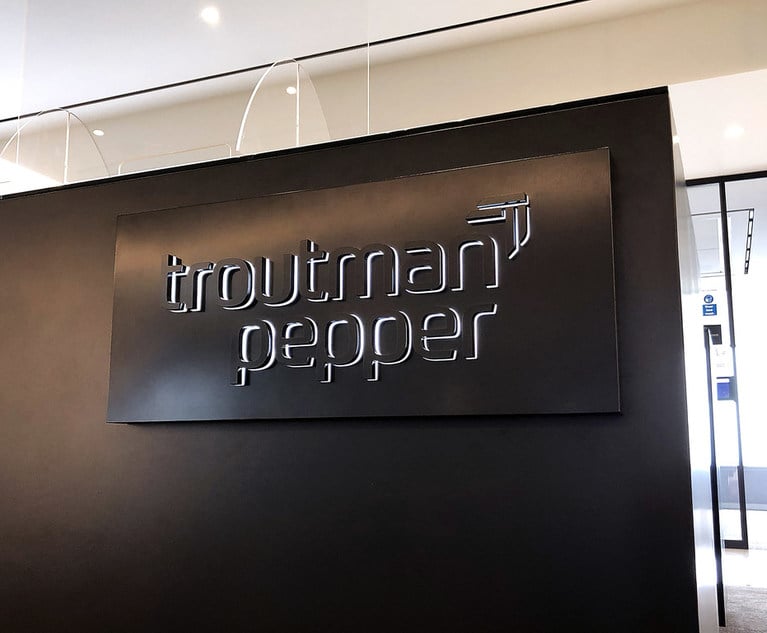With Subrogation, It's the Injured Worker Left Paying the Price
As plaintiff lawyers, we are familiar with the plight of the innocent victim following an injury. We regularly have conversations where an injured individual is forced to remortgage a home or sell property for financial support.
August 09, 2018 at 11:37 AM
7 minute read
 Maureen “Morty” Cassidy of Pond Lehocky Stern Giordano.
Maureen “Morty” Cassidy of Pond Lehocky Stern Giordano.
As plaintiff lawyers, we are familiar with the plight of the innocent victim following an injury. We regularly have conversations where an injured individual is forced to remortgage a home or sell property for financial support. Many times, they are stuck standing by as their family attempts to go on with a normal life, while everything has changed.
The Pennsylvania Constitution provides the fundamental right of legal redress, to every person who has suffered an injury at the hands of a negligent party. The right of a remedy is a legal linchpin of our state constitution, and often the most contentious. When the injury occurs at work, the Pennsylvania Workers' Compensation Act (the act) compensates for lost wages and medical benefits; within a no-fault system. A hundred years ago, the act was enacted so that injured workers were guaranteed these workers' compensation benefits, in exchange for giving up the right to sue their employer. A supposed grand bargain between employees and employers was struck for more certainty and a more expedited process of recovery than the tort system could provide to both parties.
Although one cannot file a tort claim against their employer, these injuries frequently occur due to the negligence of a third party. This then gives rise to the legal doctrine of “subrogation.” An injured worker does not lose the right to sue a negligent party, but statutory language within the act provides that a workers' compensation carrier (carrier) can subrogate against all monies recovered from a third-party case, including noneconomic damages. This right is automatic and absolute in Pennsylvania.
Subrogation is a common law doctrine developed to prevent double recovery and ensure that the party at fault, rather than an innocent party, be held responsible for the injury, as in Dale Manufacturing v. Bressi, 491 Pa. 493, 496,421 A.2d 653, 654 (1980). As an illustration, the workers' compensation insurance carrier pays an injured worker lost wages and medical benefits. The same injured worker, then receives a third-party recovery, which includes loss of wages, medical benefits and noneconomic losses, such as damages for pain and suffering. The workers' compensation insurance carrier then may employ its subrogation rights. In Pennsylvania, the carrier is entitled to subrogate the amount of the third-party recovery, reduced pro rata by costs and fees, even though some of the damages are for noneconomic losses. In other words, the carrier is paying wage loss and medical benefits for the work injury, yet they get money back for all damages paid, such as pain and suffering. Equitable? No, that math does not add up.
Subrogation lays its common law roots in the equitable principle of fairness. Section 319 of the act does not fit the common law doctrine, but rather was created by the Pennsylvania Legislature to allow a carrier to expressly receive a recovery, not subject to any equitable exceptions or limitations. This current application of subrogation is withdrawing from the balance of the grand bargain and reversing the principle of equity while promoting unjust enrichment.
The current application of Section 319 is unjust and does not promote the humanitarian purposes of the act. The statute, as applied, does not serve the purpose of providing compensation for an injury, and deprives the worker from the benefit of the grand bargain. This pattern of unlawful taking from the injured worker is depriving them the constitutional right to remedy against a negligent party while lining the pockets of the workers' compensation carrier.
Challenges to unfair subrogation statutes that do not implement the grand bargain have been successful in other states. Citing the grand bargain, in 2001, the Supreme Court of Ohio struck down its workers' compensation subrogation statute, see Holeton v. Crouse Cartage, 748 N.E.2d 1111 (Ohio 2001). Under the previous system in Ohio, an injured worker would have to pay subrogation based on estimated future payments. If it turned out the future payments were less than estimated, the carrier would keep the amount paid, resulting in a “taking” from the injured worker. The formula to determine the estimated amount also allowed the carrier to recover monies for things that were not paid for under the workers' compensation structure, resulting in a windfall for the carrier. The Holeton court ultimately forced the state's legislature to revise the state's subrogation statute to be more in tune with the grand bargain and to prevent a carrier from receiving a double recovery.
Pennsylvania is making progress. In a true victory, on June 19, the Pennsylvania Supreme Court unanimously reversed a longstanding law that allowed a carrier to assert a future credit on projected medical benefits when an injured worker settles a third-party case in Whitmoyer v. Workers' Compensation Appeal Board (Mountain Country Meats), No. 52 MAP 2017 (Pa. June 19, 2018). Prior to Whitmoyer, when an injured worker settled the third-party case, after payment of the net subrogation lien, the carrier, who remains responsible for payment of future medical expenses, would be entitled to a future reimbursement rate, or credit on the medical benefits paid, against the balance of the recovery. Meaning, the injured worker would have to pay, in cash, a certain percentage of the cost of future medical treatment related to the injury, until the recoupment of the lien was complete.
The Whitmoyer court observed that the term “installments of compensation” as used in Section 319 of the act, providing that “any recovery against such person in excess of the compensation theretofore paid by the employer shall be paid forthwith to the employee, his personal representative, his estate or his dependents, and shall be treated as an advance payment by the employer on account of any future installments of compensation,” applies only to future wage loss payments, not future medical expenses. Whitmoyer changed the landscape of subrogation, erasing the carrier's right to subrogate future medical expenses, since they are not “installments of compensation.”
Perhaps the most important aspect of the holding, is the court's view of the excess sum of a third-party recovery and what encompasses an accrued subrogation lien. “After the satisfaction of accrued subrogation lien, which encompasses 'compensation' payments made by the employer toward both disability benefits and medical expenses prior to the to the third-party settlement, the General Assembly intended the excess recovery to be paid to the injured employee and to be treated as an advance payment only on account of any future disability benefits.” Notice the two phrases used to define “compensation” in the court's decision: disability benefits and medical expenses. The court does not go so far as to say that noneconomic damages are not part of a net lien recovery, but as throughout the act, noneconomic damages are never mentioned, or defined as compensation.
Perhaps the decision in Whitmoyer will be a springboard to a future challenge to the current scheme of subrogation recovery against noneconomic damages. One can hope.
Maureen “Morty” Cassidy is an attorney at Pond Lehocky Stern Giordano. She focuses her practice on workers' compensation. She earned her bachelor's degree in telecommunications from Penn State University and her law degree from Widener University.
This content has been archived. It is available through our partners, LexisNexis® and Bloomberg Law.
To view this content, please continue to their sites.
Not a Lexis Subscriber?
Subscribe Now
Not a Bloomberg Law Subscriber?
Subscribe Now
NOT FOR REPRINT
© 2025 ALM Global, LLC, All Rights Reserved. Request academic re-use from www.copyright.com. All other uses, submit a request to [email protected]. For more information visit Asset & Logo Licensing.
You Might Like
View All
Troutman Pepper Says Ex-Associate Who Alleged Racial Discrimination Lost Job Because of Failure to Improve
6 minute read
Boosting Litigation and Employee Benefits Practices, Two Am Law 100 Firms Grow in Pittsburgh
3 minute read
Best Practices for Conducting Workplace Investigations: A Legal and HR Perspective
9 minute read
The Intersection of Labor Law and Politics Following the Presidential Election
8 minute readTrending Stories
- 1Office of Special Counsel Chief Challenges Firing 'Without Cause'
- 2'Supervisor Is a Bully:' State High Court Weighs Liability for Campaign Against Appellate Staff Attorney
- 3The M&A Partners Who Drove the Most Business as Deal Leads in 2024
- 4Judge Finds Trump Administration Violated Order Blocking Funding Freeze
- 5CFPB Labor Union Files Twin Lawsuits Seeking to Prevent Agency's Closure
Who Got The Work
J. Brugh Lower of Gibbons has entered an appearance for industrial equipment supplier Devco Corporation in a pending trademark infringement lawsuit. The suit, accusing the defendant of selling knock-off Graco products, was filed Dec. 18 in New Jersey District Court by Rivkin Radler on behalf of Graco Inc. and Graco Minnesota. The case, assigned to U.S. District Judge Zahid N. Quraishi, is 3:24-cv-11294, Graco Inc. et al v. Devco Corporation.
Who Got The Work
Rebecca Maller-Stein and Kent A. Yalowitz of Arnold & Porter Kaye Scholer have entered their appearances for Hanaco Venture Capital and its executives, Lior Prosor and David Frankel, in a pending securities lawsuit. The action, filed on Dec. 24 in New York Southern District Court by Zell, Aron & Co. on behalf of Goldeneye Advisors, accuses the defendants of negligently and fraudulently managing the plaintiff's $1 million investment. The case, assigned to U.S. District Judge Vernon S. Broderick, is 1:24-cv-09918, Goldeneye Advisors, LLC v. Hanaco Venture Capital, Ltd. et al.
Who Got The Work
Attorneys from A&O Shearman has stepped in as defense counsel for Toronto-Dominion Bank and other defendants in a pending securities class action. The suit, filed Dec. 11 in New York Southern District Court by Bleichmar Fonti & Auld, accuses the defendants of concealing the bank's 'pervasive' deficiencies in regards to its compliance with the Bank Secrecy Act and the quality of its anti-money laundering controls. The case, assigned to U.S. District Judge Arun Subramanian, is 1:24-cv-09445, Gonzalez v. The Toronto-Dominion Bank et al.
Who Got The Work
Crown Castle International, a Pennsylvania company providing shared communications infrastructure, has turned to Luke D. Wolf of Gordon Rees Scully Mansukhani to fend off a pending breach-of-contract lawsuit. The court action, filed Nov. 25 in Michigan Eastern District Court by Hooper Hathaway PC on behalf of The Town Residences LLC, accuses Crown Castle of failing to transfer approximately $30,000 in utility payments from T-Mobile in breach of a roof-top lease and assignment agreement. The case, assigned to U.S. District Judge Susan K. Declercq, is 2:24-cv-13131, The Town Residences LLC v. T-Mobile US, Inc. et al.
Who Got The Work
Wilfred P. Coronato and Daniel M. Schwartz of McCarter & English have stepped in as defense counsel to Electrolux Home Products Inc. in a pending product liability lawsuit. The court action, filed Nov. 26 in New York Eastern District Court by Poulos Lopiccolo PC and Nagel Rice LLP on behalf of David Stern, alleges that the defendant's refrigerators’ drawers and shelving repeatedly break and fall apart within months after purchase. The case, assigned to U.S. District Judge Joan M. Azrack, is 2:24-cv-08204, Stern v. Electrolux Home Products, Inc.
Featured Firms
Law Offices of Gary Martin Hays & Associates, P.C.
(470) 294-1674
Law Offices of Mark E. Salomone
(857) 444-6468
Smith & Hassler
(713) 739-1250





